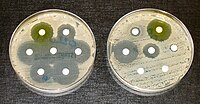
Photo from wikipedia
Abstract Background Antibiotic treatment failure is common among patients with community-acquired pneumonia (CAP) who are managed in the outpatient setting and is associated with higher mortality and increased health care… Click to show full abstract
Abstract Background Antibiotic treatment failure is common among patients with community-acquired pneumonia (CAP) who are managed in the outpatient setting and is associated with higher mortality and increased health care costs. This study’s objectives were to quantify the occurrence of antibiotic treatment failure (ATF) and to evaluate clinical and economic outcomes between CAP patients who experienced ATF relative to those who did not. Methods Retrospective analysis of the MarketScan Commercial & Medicare Supplemental Databases was performed, identifying patients ≥18 years old, with a pneumonia diagnosis in the outpatient setting, and who received a fluoroquinolone, macrolides, beta-lactam, or tetracycline. ATF was defined as any of the following events within 30 days of initial antibiotic: antibiotic refill, antibiotic switch, emergency room visit, or hospitalization. Outcomes included 30-day all-cause mortality and CAP-related health care costs. Results During the study period, 251 947 unique patients met inclusion criteria. The mean age was 52.2 years, and 47.7% were male. The majority of patients received a fluoroquinolone (44.4%) or macrolide (43.6%). Overall, 22.1% were classified as ATFs. Among 18–64-year-old patients, 21.2% experienced treatment failure, compared with 25.7% in those >65 years old. All-cause mortality was greater in the antibiotic failure group relative to the non–antibiotic failure group (18.1% vs 4.6%, respectively), and the differences in 30-day mortality between antibiotic failure groups increased as a function of age. Mean 30-day CAP-related health care costs were also higher in the patients who experienced treatment failure relative to those who did not ($2140 vs $54, respectively). Conclusions Treatment failure and poor outcomes from outpatient CAP are common with current guideline-concordant CAP therapies. Improvements in clinical management programs and therapeutic options are needed.
Journal Title: Open Forum Infectious Diseases
Year Published: 2020
Link to full text (if available)
Share on Social Media: Sign Up to like & get
recommendations!